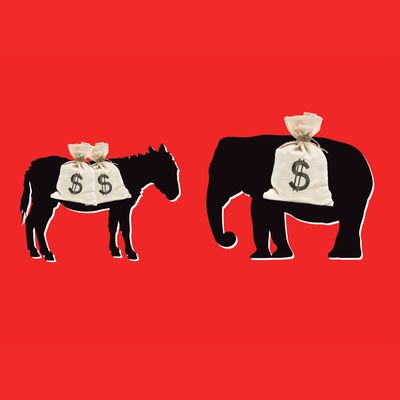
This Fox News headline is typical of many in recent weeks: “Democrat Fundraising Is Worst in a Decade.” A less partisan authority, the Washington Post’s David Weigel, had a parallel Twitter take:
It’d be apt to call this state of affairs the “Democratic Party’s Looming Fundraising Crisis,” as another headline did, if “Democratic Party” meant the same thing as “Democratic National Committee.” But the DNC and RNC are by no means the principal, or even secondary, factors in midterm-election funding. A more comprehensive assessment in The Hill notes that the playing field is pretty much even if you look beyond the national committees:
The DNC’s fundraising woes have not extended to party committees and candidates. On the House side, both the Democratic Congressional Campaign Committee and the National Republican Congressional Committee each raised about $60 million in the first six months of 2017. The Republican group has a $12 million advantage in cash on hand.
Republican House candidates have narrowly outraised Democratic House candidates, $145.4 million to $142 million.
Comparing Senate candidates is more difficult, since many more Democratic incumbents than Republicans find themselves in difficult reelection fights. But the Democratic Senatorial Campaign Committee outraised the National Republican Senatorial Campaign by a slim $700,000 margin.
You could apply that note about the broader turf that Senate Democrats must defend to House Republicans, given the huge 2010–2014 gains the GOP is defending alongside the historic midterm pattern of the party controlling the White House almost always losing seats, compounded by Trump’s poor approval ratings. Similarly, the $36 million to $21 million fundraising advantage of the Republican Governors Association to its Democratic counterpart looks impressive, until you realize the GOP is defending nearly three times as many gubernatorial seats as its rival.
In the end, all these party accounts could be dwarfed by candidates, especially wealthy self-funders. The Illinois governor’s race could wind up costing an aggregate $300 million. And Democratic candidates for governor of California have out-raised the DGA.
There is a big wild card that is not being reflected in any of these numbers: “independent” groups that supplement and sometimes eclipse party and candidate expenditures. On the GOP side, that includes the powerful Koch donor network, which can be expected to overcome its lack of enthusiasm for Trump to defend GOP congressional power next year (though there’s some talk of a big donor strike if Congress doesn’t enact tax cuts or health-care legislation before the midterms). And small-dollar online donations to nonparty funding sources have made a big comeback on the Democratic side during the 2017 special congressional elections.
While the importance of the fundraising numbers for the RNC and DNC has been grossly exaggerated, they do matter, and the turmoil and turnover at the DNC have greatly undermined the organization’s finances. For one thing, the DNC is struggling to connect with the nearly 3 million people who gave money to Bernie Sanders’s 2016 campaign, which isn’t surprising given the widespread belief in their ranks that the DNC helped “rig” the nominating process for Hillary Clinton last year. There is also an undercurrent of discontent with Democratic small-dollar-fundraising tactics, which tend to rely on negative messages that may not wear well over the long haul.
It is far too early, however, to concede a big Republican money advantage — particularly if the GOP continues to stumble in keeping its promises to past donors, large and small. Another possible problem for the GOP’s midterm effort is now coming into sight: Team Trump’s preparations for 2020. Aside from creating an alternative magnet for donations (especially the massive small-dollar donations that Trump generated late in the 2016 campaign), the president might decide to “triangulate” against his ineffective congressional allies, which could hit the GOP in places even more sensitive than the wallet.






























